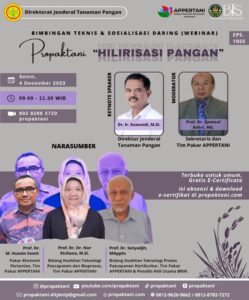Online Socialization and Technical Guidance (WEBINAR) #EPISODE 1055 PROPAKTANI

Food Crops and Horticultural Commodities Down Streaming
Propaktani episode 1055 organized by APPERTANI is a continuation of the topic of agricultural downstream episode 1006. This episode focuses more on the downstream of local food from food crops and horticultural commodities from potential industrial trees to be developed to optimize added value. Dr. Suwandi, Director General of Food Crops encourages people to consume local food, love domestic production as an encouragement for farmers to continue to provide food for all of us. The moderator of this webinar episode was Prof. Dr. Sjamsul Bahri, MS, Secretary and APPERTANI expert team.
Prof. Dr. M. Husein Sawit, APPERTANI Agricultural Economics Expert Team delivered the topic: “Downstream Rice Industry and Its Associated Products: Why is it slow to develop”. He regretted that research on macro aspects of the rice milling industry (RMI) was very minimal, besides not having analyzed the relationship between RMI and other industries in the national economy. RMI with the main output of rice and its associated products as intermediate products, as well as final demand called “direct linkage in the future” there are 21 types of downstream industries. RMI requires grain in addition to other inputs as “a direct link back” to only 8 industries. RMI is dominated by small rice mills (SRM) with limited utilization of associated products. If the RMI sector is strengthened by modern rice milling, the use of rice or its associated products will grow.
Prof. Dr. Dr. Sri Nur Richana, M.Si. APPERTANI Expert Team for Postharvest and Bioprocess Technology, delivered the topic: “Process Technology of Alternative Food Sources Based on Food Crops”. The Covid-19 pandemic and global geopolitical conditions have an impact on food systems that are sensitive to climate change but must be friendly to public health. For this reason, intensive efforts are needed to find nutritious local food amid rising rice prices. Research on cereal process technology and various tubers has been carried out to support the downstream of food crop industry trees that can be developed by industry. Public education is very important regarding food diversification including a) good cultivation and post-harvest methods, b) appropriate processing methods; and c) good nutritional content of food. The main target of public education is to reduce dependence on rice and imported raw materials/food in meeting food needs.
Prof. Dr. Setyadjit, M.AppSc, APPERTANI/BRIN Expert Team in Horticultural Postharvest Process Technology delivered the topic: “Horticulture-Based Alternative Food Source Process Technology” as an alternative starch source based on horticultural crops such as fruits and vegetables to support downstream according to horticultural crop industry trees. The processing technology of bananas, breadfruit, potatoes has been available to be developed by the food industry. The government is expected to bridge the use of inventions by the food industry to produce products that can be enjoyed by the community, strengthen food security, especially rice through food diversification.


